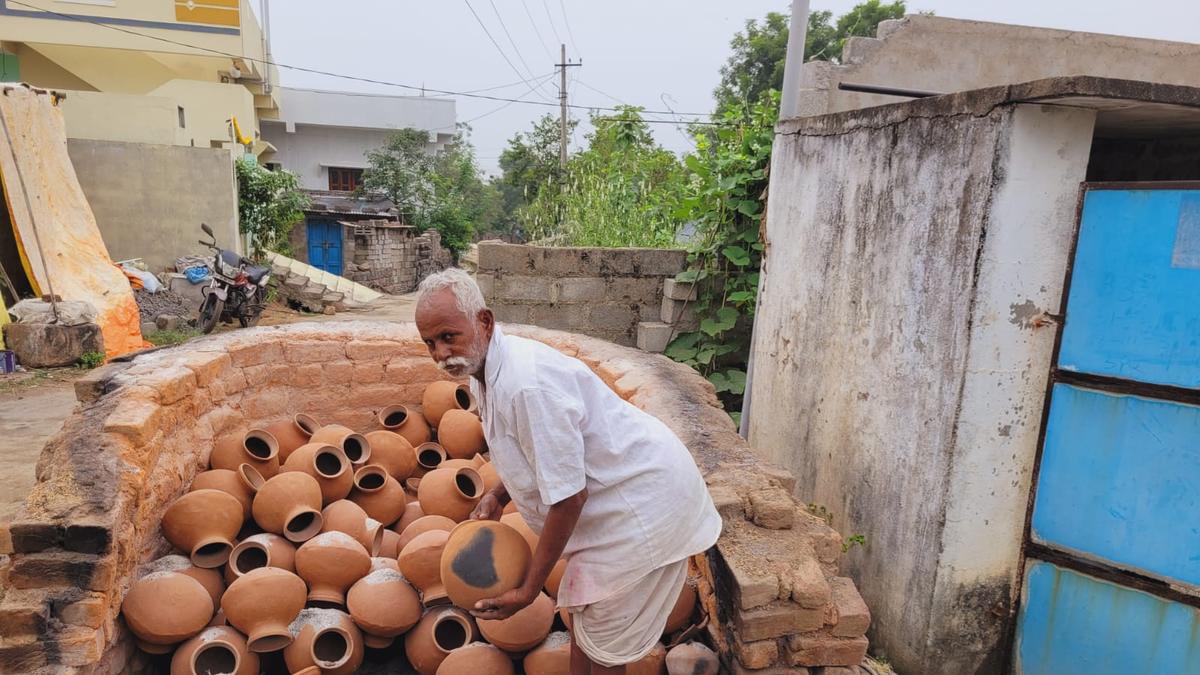
Telangana kula ganana | New survey, renewed hopes Premium
The Hindu
Telangana government’s announcement of an intensive socio-economic survey has sparked fresh anticipation among rural communities, rekindling memories of the 2014 Samagra Kutumba Survey — a tense, single-day event carried out by the then BRS government.
Pochampally Komuraiah sits by his weathered kiln, the faint warmth from his Diwali diya sales already fading and his gaze fixed on an uncertain horizon. A potter from Bhupathipur village in Telangana’s Peddapalli district, the 65-year-old’s hands still shape clay with a skill honed across generations, yet his livelihood faces the threat of dwindling patronage. The number of potters in this village, once a bustling pottery hub, where 80 families used to thrive on their craft, has reduced to just two — Komuraiah is among the last, carrying the torch of tradition against the gusts of rapid urbanisation.
With his son having migrated to Dubai in search of greener pastures a few years ago, Komuraiah says he stands alone in sustaining his ancestors’ craft. The Telangana government’s upcoming statewide socio-economic survey from November 6 has given him a glimmer of hope, a potential boost for artisans like him who rely on pottery’s quiet but essential presence in daily life — from clay pots for weddings to ceremonial earthenware for village goddesses. “I make clay pots for toddy tappers too,” he notes underlining the importance of pottery intertwined with other traditional occupations.
The survey’s promise of government intervention is a small ray in the veteran potter’s life. “We are pinning hopes on the upcoming kula ganana to ascertain the socio-economic status of rural artisans and government’s policy interventions to give a fillip to traditional occupations,” he says.
The last intensive household survey — Samagra Kutumba survey — conducted on a single day in August 2014 by the previous Bharat Rashtra Samithi (BRS) regime, had also stirred hope among artisans like Komuraiah, promising new support for traditional crafts and livelihood opportunities. Yet, for many, those promises never materialised. Some potters, disheartened, turned to farming or other trades.
“My son, who was working for a private company in Hyderabad then, had to hire a vehicle and rush to our village, along with his wife and children, to participate in that household survey,” he recalls, adding, “We, however, did not receive any benefit from it.”
Bakkaiah, another resident of Bhupathipur, hopes that the new survey will document the percentage of Backward Classes (BCs) in the population, paving the way for determining quotas in local body elections — a step that he believes could lead to much-needed economic and political empowerment for BCs.
“I toil in the palm grove every day to earn a livelihood by tapping toddy, enduring the risks of falling from Thati (palm) trees that are 30 to 40 feet high. My daily earnings are less than ₹250,” says 48-year-old Burra Srinivas Goud from Irukulla village in Karimnagar rural mandal.

The girl, who was admitted to Aster CMI Hospital with alarming breathlessness and significant pallor, was diagnosed with Wegener’s Granulomatosis (now known as Granulomatosis with Polyangiitis or GPA), a rare autoimmune condition that causes spontaneous bleeding in the lungs, leading to acute respiratory failure.

ACB files case against IPS officer N. Sanjay in Andhra Pradesh. The official is accused of manipulating the tender processes for awarding contract for development and maintenance of AGNI-NOC portal, and conducting awareness meetings for SC/STs. It is alleged that the total value of properties stolen, or involved in the case is estimated at ₹1,75,86,600.









